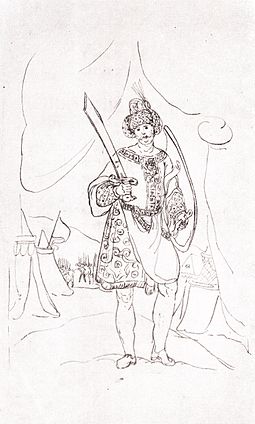Rostom of Kartli
| Rostom | |
|---|---|

King Rostom by Teramo Castelli
|
|
| King of Kartli | |
| Reign | 1633–1658 |
| Successor | Vakhtang V of Kartli |
| Born | 1565 |
| Died | 1658 |
| Burial | Qom, Iran |
| Spouse | Ketevan Abashishvili Mariam Dadiani |
| Issue | Vakhtang V of Kartli (adopted) |
| Dynasty | Bagrationi dynasty |
| Father | David XI of Kartli |
| Religion | Islam |
| Signature |  |
Rostom or Rustam Khan (Georgian: როსტომი or როსტომ ხანი) (1565 – 17 November 1658) was a king of Kartli, eastern Georgia, from 1633 until his death. Appointed by a Persian shah as a Wāli (i.e. viceroy) of Kartli, he styled himself king of kings and sovereign in Georgian customs.
A son of Daud Khan, a Georgian prince and convert to Islam, by a concubine, he was born Khosro Mirza and brought up Muslim at the Persian court. An intelligent and resolute in his decisions, he soon attracted the attention of Shah Abbas I of Safavid who appointed him, in 1618, a darugha (prefect) of the capital Isfahan. From 1625 to 1626, he took part in suppression of the Georgian opposition: he commanded a right flank at the victorious Battle of Marabda and saved part of the Persian troops from a complete disaster at the Battle of Ksani. In 1626, Khosro Mirza was recalled from Georgia and appointed a commander of the Shah's guard Quli. In 1630, Abbas, lying on a deathbed, urged him to protect a grandson and heir Sam Mirza, the future Shah Safi, whom Khosro served faithfully. In 1630, he led a Persian army which defeated the Ottoman forces and captured Baghdad. In the early 1630s, he took part in sidelining and destruction of the Undiladze family which had dominated the Saffavid court for years. As a reward, he was appointed, in 1633, a wali of Kartli at the age of 67 and sent to suppress the opposition of Georgians who had managed to unite the eastern regions of Kartli and Kakheti under Teimuraz I for a brief period of 1630-1633. He adopted a name Rustam (Rostom, როსტომი, in Georgian transliteration) and came to Georgia with a large Persian army commanded by his fellow Georgian Rustam Khan. He soon took control of Kartli and garrisoned all major fortresses with Persian forces, bringing them, however, under his tight control. His willingness to cooperate with his suzerain won for Kartli a larger degree of autonomy. A period of relative peace and prosperity ensued, with the cities and towns being revived, many deserted areas repopulated and commerce flourished. Although Muslim, Rostom helped to restore a major Georgian Orthodox cathedral of Living Pillar (Svetitskhoveli) at Mtskheta, and patronised Christian culture. However, Islam and Persian habits predominated at his court. He ruthlessly crushed an opposition of local nobles, putting to death the catholicos Eudemus I of Georgia, and invaded, in 1648, Kakheti, forcing Teimuraz to flee to Imereti (western Georgia).
...
Wikipedia
